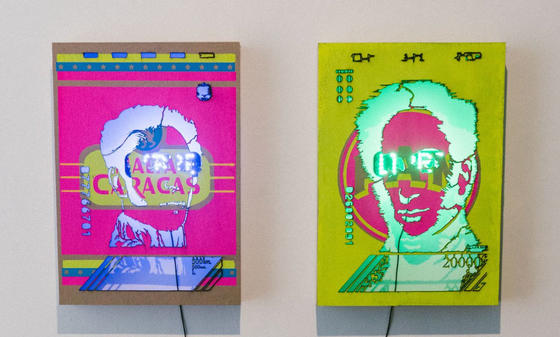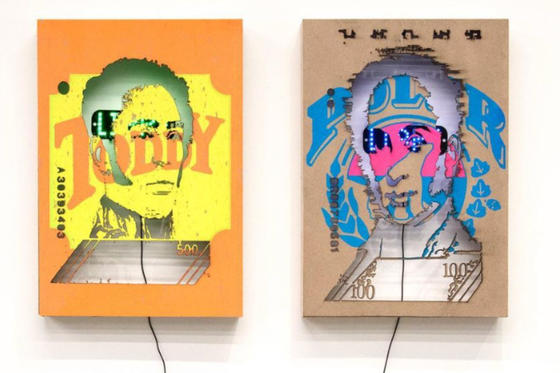Money Has No Smell is a group exhibition that presents works by three artists: Ignacio Gatica, Mariana Parisca, and Gabriella Torres-Ferrer. Curated by ACOMPI (Jack Radley and Constanza Valenzuela) and mentored by Rosario Güiraldes, the exhibition brings together recent works that trace flows of currency to and from the artists’ places of origin, in the process addressing the complexity of globalized and interdependent financial systems.
This truly was a collaboration and Parisca collaborated on some of her pieces with another Mason School of Art faculty member, Luis Vasquez La Roche. You can learn all about the show here:
Money Has No Smell
Ignacio Gatica, Mariana Parisca, Gabriella Torres-Ferrer
Curated By ACOMPI
Mentor: Rosario Güiraldes
July 21st – September 2nd, 2022
Public Reception: Thursday, July 21, 6-8 Pm
The phrase “money has no smell” suggests that our perception of capital can be untethered from and untainted by its source. Through a variety of media that utilizes both physical and digital representations of money, the works in the exhibition eschew easy understandings of its origin. They instead provoke a consideration of both systemic and intangible forces—neoliberalism, nationalism, colonialism—that iteratively (and often covertly) assign money value.

The three artists in Money Has No Smell render money—and the goods and services it buys—as a melange of ideologies discreetly manifested in our global systems, replete with insidious tendencies toward agglomeration of power, corporate greed, and political exploitation. Mariana Parisca’s woven altarpiece, wall safes, and lightboxes all hold remnants of the bolívar—a currency named after the 19th century Venezuelan leader—contrasting its material, economic, and subliminal values as the country experiences drastic inflation. Ignacio Gatica’s screen-based work subverts the sleek technology of the modern stock ticker and its endless scroll to warn of the inherent contradictions of capitalism and the economic disparities it has produced in Chile and across the globe. Gabriella Torres-Ferrer’s living sculptures utilize the complex history of pineapple and plantain exports and the modern technology of cryptocurrency to explore the entanglements of trade, labor, and colonialism between Puerto Rico, the United States, and other international markets. Together, the works employ methodologies of withdrawal, exchange, abstraction, and transformation—actions that mirror the movement of capital itself.

Situated in the financial epicenter of the United States in the wake of compounded global crises, Money Has No Smell presents work that navigates borders, mines and extracts resources, and creates networks of exchange among the people and places affected by the seemingly untraceable impacts of worldwide financial systems. As catalogue essayist Meghana Karnik reflects, “Within this uneasy zeitgeist, these artists channel a sense of disillusionment and a search for spiritual meaning that bring us back to basic questions of what equality, prosperity, sovereignty, and interdependence might look like.”

About the Artists
Ignacio Gatica (Chilean, b. 1988) currently lives and works in Brooklyn, New York. Gatica works in installation, sculpture, video, and text to question systems of knowledge that configure personal and collective experiences. Concerned from an analytical standpoint with the experience of urban living, Gatica’s work modifies the elements that construct these socio-political spaces, merging data, materials, and theoretical frameworks to reconfigure particular views. Gatica has exhibited at SculptureCenter (Queens, NY); the Hessel Museum of Art at CCS Bard (Annandale-on-Hudson, NY); El Museo del Barrio (Manhattan, NY); Galeria Jaqueline Martins (São Paulo, Brazil); Galeria Gabriela Mistral (Santiago, Chile); Fondation Hippocrène (Paris, France); and Fundación Marso (Mexico City, Mexico), among others
Mariana Parisca (Venezuelan/American, b. 1992) is an interdisciplinary artist and educator. She creates sculpture, installations, videos, performances, and printed matter that question and redefine the social abstractions that shape value, resource distribution, and consumption in the Americas. Her work has been shown at documenta 15 (Kassel, Germany); Mas Allá (Bogota, Colombia); Rudimento (Quito, Ecuador); NARS Foundation (Brooklyn, NY); the New Wight Biennial (Los Angeles, CA); Museum of History and Culture, Anderson Gallery, and Cherry Gallery (Richmond, VA); Virginia MOCA (Virginia Beach, VA); Bruno David Gallery (St. Louis, MO); and New Works Gallery (Chicago, IL), among others. Parisca has received numerous awards and residencies. She is currently a resident at Studio Two Three and the Visual Arts Center of Richmond, and teaches sculpture at George Mason University.
Gabriella Torres-Ferrer (Puerto Rican, b. 1987) is a multimedia artist and researcher whose practice considers futurability, power dynamics, and means of exchange in a globalized networked society. Their transmedial practice integrates new media, installation, video, web-based interventions, and other experimentations. Torres-Ferrer’s work has been shown at The Wrong New Digital Art Biennale; A.I.R. Gallery (Brooklyn, NY); Phillip Martin (Los Angeles, CA); Galería CURRO (Guadalajara, Mexico); and Embajada (San Juan, Puerto Rico). Their work has also been shown at the Whitney Museum of American Art (with Occupy Museum, 2017), El Museo del Barrio (Manhattan, NY), and the Hessel Museum of Art at CCS Bard (Annandale-on-Hudson, NY, 2022). In 2020, Torres-Ferrer received a guest artist prize from CERN (Geneva) and enrolled in the Akademie Schloss Solitude’s international artist-in-residence fellowship. Torres-Ferrer is represented by Embajada (San Juan, Puerto Rico).
About the Curators
ACOMPI is a New York City-based, globally focused curatorial practice founded by Jack Radley and Constanza Valenzuela. The name ACOMPI derives from the Spanish word acompañado, meaning “in company.” ACOMPI highlights interdisciplinary practice and collaboration, and serves as a youth-oriented, community-ingrained platform to expand the intersection of independent curatorial practice and site-responsive public engagement. ACOMPI celebrates narratives of immigrants, youth, and artists working in interdisciplinary means not satiated or supported by the current market.
Recent projects by ACOMPI include: Ocultismo y barro, Miriam Gallery (Brooklyn, NY); Mariana Parisca: Corriente, Más Allá (Bogotá, Colombia); Crispy Tostones: Oro, Pari Passu Gallery in collaboration with Sabroso Projects (Queens, NY); Transient Grounds in collaboration with NARS Foundation (Governors Island, NY); Diana Sofia Lozano: Suspended in the Iris, Home Gallery (Manhattan, NY); Shanzhai Lyric: Canal Street Research Association in collaboration with Wallplay; and “What Can NYC Art Museums Do For Immigrants?” a colloquium at NYU Steinhardt. ACOMPI’s work has been featured in The New York Times, Artforum, New York Magazine, artnet, The Brooklyn Rail, Elephant, and Hyperallergic, among other publications. They can be found at @acompi.nyc.
About the Mentor
Rosario Güiraldes is a curator from Argentina currently based in New York City. She is the Associate Curator at The Drawing Center. Recent curatorial projects at The Drawing Center include the contemporary drawing survey Drawing in the Continuous Present (2022), with Michael Armitage, Christine Sun Kim, Helen Marten, Walter Price, and others; 100 Drawings from Now, with Lauren Halsey, Jennifer Packer, Christina Quarles, Rirkrit Tirivanija, and others (2020); The Pencil is A Key: Drawings by Incarcerated Artists (2019); and monographic exhibitions by Fernanda Laguna (2022); Ebecho Muslimova (2021); Guo Fengyi (2020); and Eduardo Navarro (2018). In 2017, she organized Forensic Architecture: Towards an Investigative Aesthetics; a major survey of interdisciplinary collective Forensic Architecture that toured the Barcelona Museum of Contemporary Art (MACBA) and the University Museum Contemporary Art (MUAC) in Mexico City earning Forensic Architecture a Turner Prize nomination. Güiraldes holds a Master of Arts focused in Curatorial Studies from the Center for Curatorial Studies (CCS Bard) and is currently on faculty in the Department of Painting and Printmaking at Yale School of Art.
Exhibition Materials
Credits
Money Has No Smell, curated by ACOMPI with works by Ignacio Gatica, Mariana Parisca, and Gabriella Torres-Ferrer. Presented at CUE Art Foundation, 2022. Graphic design by Mikki Janower.
Press Release
Download a PDF version of the exhibition press release.
Press
Steinhauer, Jillian, “What to See in N.Y.C. Galleries Right Now.” The New York Times, August 19, 2022.
Catalogue
Money Has No Smell is accompanied by a color catalogue with texts by ACOMPI, Rosario Güiraldes, and Meghana Karnik. The catalogue is available to read online, and a print version is available free of charge to gallery visitors.
Meghana Karnik’s catalogue essay, “MONEY METAPHYSIC$” is also available to read on our website.
